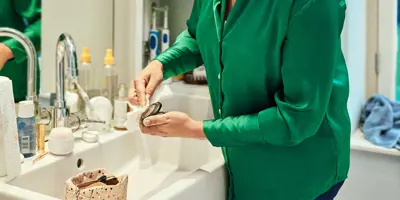10 people found this helpful

Being a parent comes with everlasting love – and everlasting mess! And while we wouldn’t have it any other way, it does mean that wetting the bed is a familiar part of both childhood and parenthood. It’s quite common – in fact about 1 in 10 children has trouble with daytime wetting at the age of 5, and night-time bed wetting is even more common1 – so you’re certainly not the only one having to deal with occasionally cleaning a wet bed!
When your child wets the bed, your main priority will of course be to get them back to sleep quickly, comfortably and in clean sheets. Urine stains and smells become harder to remove the longer you leave them, so if your child has wet the bed, it’s key to remove urine from the mattress as soon as possible.
Take a look at our step-by-step guide to find out exactly how to clean pee out of a mattress in just 10 simple steps. It’ll help you get the job done quickly and easily, so you and your child can both go back to sleep feeling comfortable.
Before you clean a wet bed, let’s cheer them up
Removing urine from a mattress in the middle of the night, with sleep still in your eyes, can be tiresome. You might be a little tired and a little stressed about how to clean pee out of a mattress as soon as you can, but it’s important your child doesn’t feel bad for wetting the bed. Bedwetting is a normal part of childhood, and we’ve all been there! It’ll make things worse if they feel very self-conscious about it, so here are a few important things to remember when your child has wet the bed:
- Reassure them that you’re not cross with them.
- Remind them it’s not their fault.
- Give them a hug and help them clean themselves up, dry them off and get them a fresh change of clothes.
Tip
One of our favourite potty-training tips is to keep soft and super-absorbent cleaning materials nearby for when these little accidents happen. It can be helpful to know exactly where the kitchen roll is kept so you can be ready to respond – why not make it Plenty The Original One?
How to clean a wet bed: first thing’s first
The sooner you deal with a wet bed, the easier it is to get rid of stains and remove urine odour from the mattress and sheets. It’s best to start the process as soon as you’re aware there's been a little accident.
- Strip the bed. Remove the mattress protector, sheets, and bedding, and wash them in the machine. If there are visible stains, give them a quick scrub by hand with some laundry detergent or stain remover before you put them in the washing machine.
- Change the bedding. If you have a waterproof mattress in the bedroom, simply change the bedding, and put your little one back to bed. If not, it’s time to get cracking on those urine stains on the mattress!
Tip
If it’s late at night, or you’re pressed for time, you can give the mattress protector and bedding a soak in some warm water and detergent until you have time to wash them. This will also aid in reducing the urine stains on the mattress.
How to get pee out of a mattress
Tip
Plenty kitchen roll is also great for cleaning up spills and splashes, from your little ones’ little wees, to coffee on the carpet. We’ve even written a separate guide, which you can read here!
If you didn’t have a waterproof mattress protector fitted, pay attention to these next steps for how to clean urine on a mattress and ensure you remove that urine odour:
- Find another bed. Put your child to sleep in another bed as you will need to give the mattress time to dry properly.
- Blot the excess. Use absorbent paper towels to remove urine from the mattress as thoroughly as you can. Use a blotting method to avoid rubbing the stain around the mattress.
- Sprinkle baking powder onto the stain to soak up the remaining moisture.
- Mix a cleaning solution. You could use equal parts white vinegar2 and water, or your usual washing powder and water. Spray the solution over the stained area.
- Leave the solution to work. You should let the solution sit on the stain for 5 to 10 minutes.
- Blot up the liquid again. Use more paper towels to get the mattress as dry as possible.
- Sprinkle more baking soda over the whole surface of the mattress. Now you should leave it to dry for at least 18 hours. Wondering how to get rid of the pee smell? Baking soda will help the mattress to dry out and is also a great way to remove urine odour from a mattress.3
- Vacuum it up. The next day, vacuum up the baking soda and prop up the mattress to air it out for a few hours before making the bed again. This ensures there will be no urine stains on the mattress in the future!
A few reasons why your child may have wet the bed
As important as understanding how to get pee smells out of a mattress is, it’s also key to get to the bottom of why it happened in the first place. There are a number of potential reasons why your child has wet the bed:
- Some children simply need more time for their bladder to develop.4
- The feeling of needing to pee doesn’t cause them to wake up.
- Drinking too much before bed, and thus making too much pee during the night.
- Stress at school or at home.
- An underlying medical condition.1
Tip
If you are worried that there may be something more serious going on, it’s always best to get in touch with a medical professional such as your GP to get advice and reassurance from them.
How to avoid having to clean up a wet bed
As loveable as your children are, and as common as it is, bedwetting (and the subsequent clean-up) can be a bit tiresome… literally! Recommended by the NHS, here are a few simple things you can do at home to help your children stay dry at night5 so they can stay dry and comfortable throughout the night.
- Limit drinks in the lead up to bedtime. Children should be allowed to drink when they are thirsty, however it can be a good idea to reduce the intake of drinks right before bed.
- Consider setting an alarm for nightly toilet trips. Until your child is reliably able to tell when they need to go to the toilet, your GP may suggest setting a bedwetting alarm to get them up and take them for a wee during the night yourselves.
- Get them to pee before bed. It’s a good idea to encourage your children to pop to the toilet before they head to bed. Going to bed with an empty bladder could help them avoid needing to go for a wee in the night.
- Leave the bathroom light on. Making it easier for them to find the toilet will reduce the chance they have an accident because they don’t want to head to the bathroom in the dark.
- Consider setting up a reward system6. That’s not to say that they should be punished for having an accident and wetting the bed, but a reward system could help them head in the right direction by rewarding them for hitting milestones like a whole night dry and remembering things like going to the toilet every night before bed.
Tip
You can take steps to reduce the chance of your child wetting the bed, however the first time a child wets the bed is probably not going to be the last. While they’re still not quite used to getting up in the middle of the night for the toilet, you can make it easier to prevent urine stains on mattresses by keeping a protective waterproof cover under the sheets, so you don’t have to remove urine from the mattress every time.
So, there you go. You now have a handful of reasons why your child may be wetting the bed, tips to help prevent it from happening and of course a simple guide for how to clean a wet bed if it does happen. Remember these tips and we’re sure they will come in handy next time. Most important to remember, however, is that accidents happen!
Sources:
1 Definition & Facts for Bladder Control Problems & Bedwetting in Children
2 Method for removing odor from vinegar, Google Patents
4 Bedwetting: 5 Common Reasons Why Children Wet the Bed, Nationwide Children’s Hospital
6 What are the treatment options for bedwetting? National Library of Medicine
Related articles
Your guide to disinfecting and deep cleaning the house
Learn the difference between deep cleaning the house and disinfecting your home, and tips on how to do deep clean and disinfect your home.
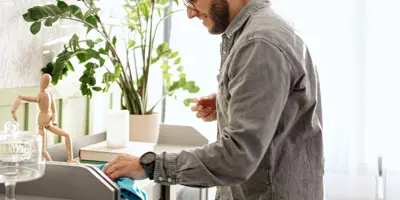
Air fryer cleaning: how to clean an air fryer
Learn how to keep an air fryer clean, how to clean your air fryer as well as other top air fryer cleaning tips with this handy air fryer cleaning guide.
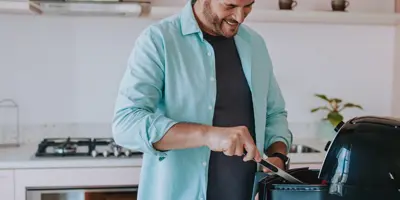
How to clean a TV screen: Plenty’s top tips for a sparkling clean TV
Discover the best way to clean TV screens with Plenty. Tired of a streaky, thumbprint-covered picture? Read how to clean a TV so it looks brand new!
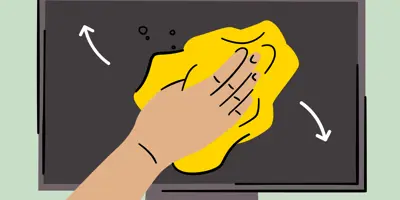
How to Clean Baby Toys & Disinfect Toys Covered in Goo
Being a parent involves many skills, like knowing how to sanitise baby toys! Find out how to clean soft baby toys, hard bath toys and teething toys here.
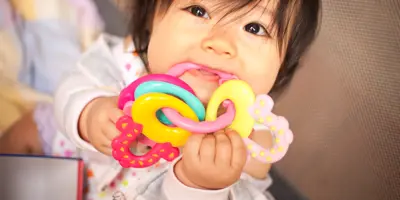
How to clean the washing machine seal when it's looking gunky
Cleaning a washing machine seal is boring but important! Learn about cleaning the rubber seal on a washing machine and how to prevent future gunkiness.
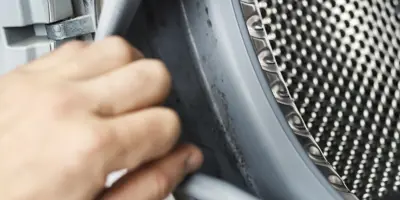
Gurgling sink? How to unclog a sink
Need to know how to unclog a sink? You’re in luck! Here you’ll learn about unclogging a sink with baking soda (a.k.a. bicarb) and with specialist cleaners.
